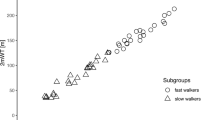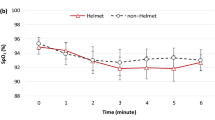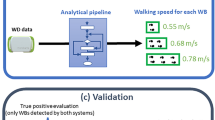Abstract
Aims
To examine test-retest reliability of the 30-metre walk test (30mWT) in patients with chronic obstructive pulmonary disease (COPD) and to compare the 30mWT with the 6-minute walk test (6MWT).
Methods
Forty-nine subjects with stable COPD were included. The 30mWT consists of walking at different walking intensities over a distance of 30 metres — self-selected speed (ss-30mWT) and maximal speed (ms-30mWT). The test was conducted twice and the time to walk 30 metres was recorded. The 6MWT was performed in duplicate on the same day.
Results
Test-retest reliability was high: intraclass correlation coefficient (ICC2.1) = 0.93 (95% CI 0.87 to 0.97) for maximal walking speed and 0.87 (95% CI 0.78 to 0.93) for self-selected walking speed. Both maximal and self-selected speed had a standard error of measurement (SEM) of 0.07 m/s and SEM% was 4.4 for maximal speed and 5.9 for self-selected speed. The correlation, criterion validity, between ms-30mWT and the 6MWT was r=0.78 (p<0.001). Heart rate, dyspnoea, exertion and oxygen saturation were more affected after the 6MWT than after the 30mWT (p<0.001).
Conclusions
The 30mWT is a reliable submaximal test that is easy to perform and can be used to measure physical function (walking ability) in patients with COPD. It may be well suited for primary care settings.
Similar content being viewed by others
Article PDF
Author information
Authors and Affiliations
Contributions
MA recruited participants in Uppsala, wrote the manuscript, and together with US and ME was responsible for data analysis strategies. LM recruited subjects and collected data in Gothenburg. US designed and initiated the study in collaboration with ME. AS and HJ participated in designing the experiment and collecting data in Uppsala. Furthermore, all authors contributed in revising the manuscript.
Corresponding author
Ethics declarations
Competing interests
The authors declare that they have no conflicts of interest in relation to this article.
Rights and permissions
About this article
Cite this article
Andersson, M., Moberg, L., Svantesson, U. et al. Measuring walking speed in COPD: test-retest reliability of the 30-metre walk test and comparison with the 6-minute walk test. Prim Care Respir J 20, 434–440 (2011). https://doi.org/10.4104/pcrj.2011.00082
Received:
Revised:
Accepted:
Published:
Issue date:
DOI: https://doi.org/10.4104/pcrj.2011.00082
This article is cited by
-
Mobility related physical and functional losses due to aging and disease - a motivation for lower limb exoskeletons
Journal of NeuroEngineering and Rehabilitation (2019)
-
Long-term outcomes following lower extremity press-fit bone-anchored prosthesis surgery: a 5-year longitudinal study protocol
BMC Musculoskeletal Disorders (2016)
-
Alternative field exercise tests for people with respiratory conditions
Current Physical Medicine and Rehabilitation Reports (2015)
-
Physical activity level and its clinical correlates in chronic obstructive pulmonary disease: a cross-sectional study
Respiratory Research (2013)



